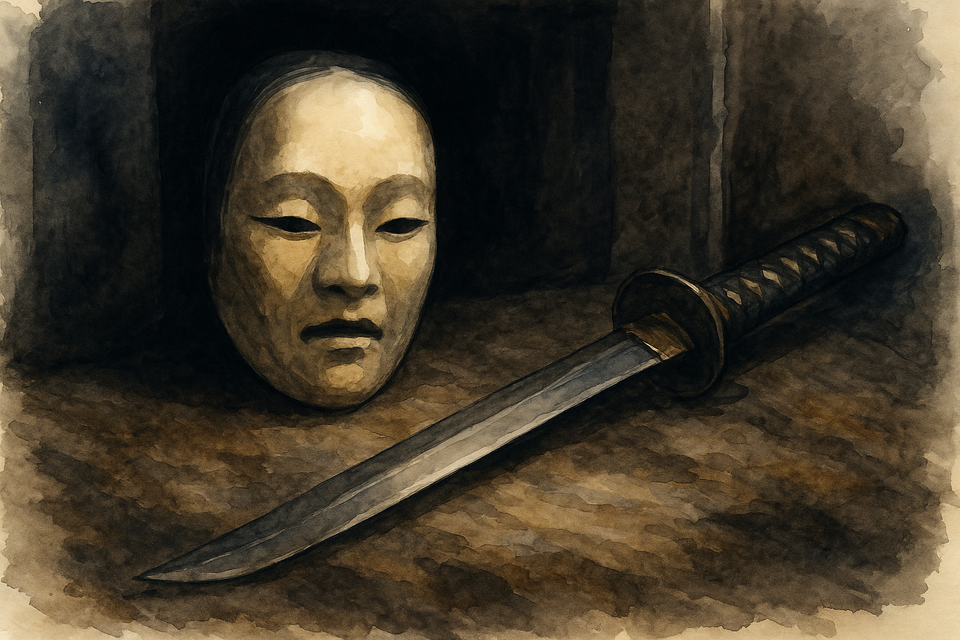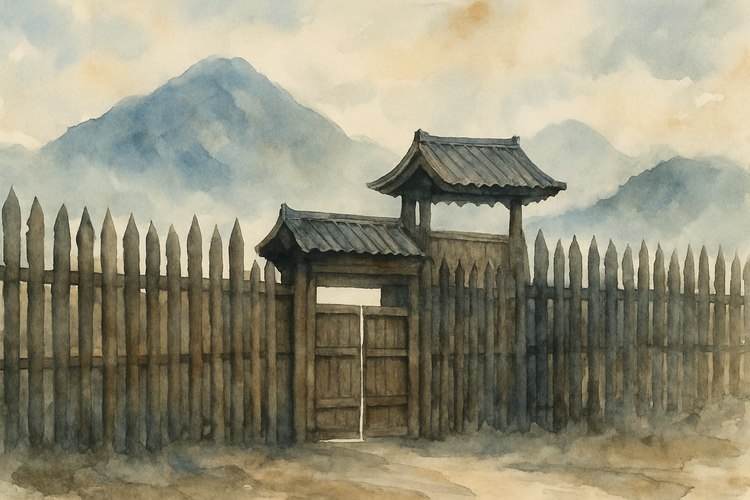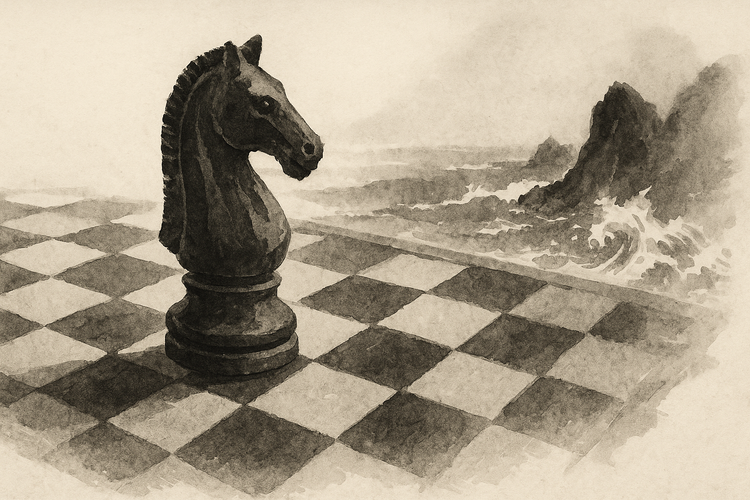Shōgun S1E3 "Tomorrow is Tomorrow"

Extensive spoilers follow for Episode 3
Illusions of Survival
In Shōgun’s third episode, “Tomorrow is Tomorrow,” Lord Toranaga counsels his son against the illusion of friends and enemies, warning that a man can rely only on himself. Yet the hour itself exposes the fragility of that creed. Masks, betrayals, and shifting allegiances dominate every turn, but survival is never solitary. Toranaga endures not by isolation but through the desperation, duty, and calculations of those around him. What emerges is a portrait of survival where loyalty and self-preservation blur, and where the strongest bonds are forged not by trust, but by necessity.
Yabushige’s Summons
The episode begins with Kashigi Yabushige in a posture of defeat, drafting his will as though suspicion itself has already condemned him. His paranoia is both comical and tragic, a sign of a man who believes fear itself is proof of guilt. For Yabushige, survival has always been a calculation, a balance of risk and advantage, and here he seems to assume the sums no longer favor him. Toranaga’s summons proves otherwise, though not because the bond between them has grown stronger. Instead, Toranaga coolly reveals that the assassins of the Society of Amida had not been after him at all, but after John Blackthorne, the “Anjin” whose presence has unsettled Osaka’s fragile balance.
The disclosure unsettles Yabushige, reminding him how little he truly understands of the currents swirling around Toranaga. Once again, he is neither trusted nor fully discarded, but offered a bargain: survive, but only as long as he proves useful. Even the apparent gift of territory — control over Suruga — is not a reward so much as a leash, a tether disguised as generosity. In Toranaga’s world, even survival comes chained to obligation.
The Caravan and the Ambush
From Yabushige’s uneasy reprieve, the story shifts to Toranaga’s next gamble: slipping out of Osaka under the eyes of his enemies. The plan is simple: a caravan carrying Kiri no Kata, Toranaga’s wife, and Blackthorne is to travel to Ajiro. Yet at the last moment Toranaga himself takes Kiri’s place inside her litter, trading her visibility for his concealment. It is a mask of survival worn not on the battlefield but in silence and secrecy. The image of a warlord hidden in his wife’s palanquin is striking — power shielded not by armies, but by disguise.
The switch does not go unnoticed. Blackthorne sees the ruse, as does Mariko, and it places him in a position of rare power. With one cry he could expose Toranaga and end the game. Instead, when a second inspection threatens to pierce the disguise, he diverts attention and allows the caravan to pass. For Toranaga, who counsels his son never to rely on others, the irony is sharp: his life in this moment depends on the intervention of a foreigner.
The escape, however, is far from clean. The convoy is ambushed by forces loyal to Regent Kiyama, and Toranaga’s disguise can no longer shield him. The clash turns desperate, culminating in a sacrifice that carries the weight of honor and inevitability. Toda “Buntaro” Hirokatsu, Mariko’s husband, steps into the breach, fighting against overwhelming odds to buy Toranaga’s party time to reach the harbor. Yet the camera never shows him fall. His fate is left suspended, and in that ambiguity Buntaro becomes a tragic figure: brittle in private, unwavering in duty, and consumed by a loyalty that remains unresolved. The silence around his end mirrors the silence of Toranaga’s disguise — both concealment and absence charged with meaning.
The Harbor and the Black Ship
At the harbor, survival hinges not on disguise but on negotiation. The Portuguese Black Ship, commanded by Captain-General Ferreira, offers a path through Ishido’s blockade, but only at a steep price. In exchange for passage, Ferreira demands revenue, church privileges, and, most cruelly, Blackthorne himself. To the Jesuits he is a heretic and a threat, to the Regents an intruder, and to Toranaga a tool whose value can be bartered away. Blackthorne’s place could not be more precarious. When Ferreira insists he be surrendered, Toranaga allows it, and Blackthorne finds himself effectively doomed.
His response is not noble allegiance but desperation: he seizes one of Toranaga’s own galleys and forces his way through the blockade in tandem with the Portuguese carrack. What looks like loyalty is, in truth, self-preservation — lashing his survival to Toranaga’s because only there does he stand a chance to endure. Yet in turning necessity into leverage, he binds himself more tightly to the very lord who had moments earlier bartered him away. The harbor sequence throws Toranaga’s philosophy into sharp relief. Friends and enemies may be illusions, yet survival can still forge bonds, however fragile, that shape destinies. Blackthorne may not be loyal in the romantic sense, but his desperation carries the same weight: it keeps Toranaga alive.
The Council Resignation
While Toranaga maneuvers at sea, another play unfolds in Osaka Castle. His general, Toda Hiromatsu, delivers a stunning announcement to the Council of Regents: Toranaga has resigned his seat. On its face, it looks like capitulation — surrendering his place among the five Regents and yielding to Ishido. In truth, it is absence used as strategy. With only four Regents remaining, the council has no quorum, and the vote to depose Toranaga collapses under its own weight. It is an act of political judo, turning weakness into strength, absence into paralysis. Stripped of his disguise in the caravan and nearly bartered away in the harbor, Toranaga now disappears from the board entirely, leaving his enemies frozen.
Hiromatsu’s loyalty cloaks the maneuver in dignity, but the strategy itself rests not on trust or allies. It is a game of rules and numbers, masks and absences, played so deftly that Toranaga’s supposed weakness becomes his shield.
Tomorrow Is Tomorrow
With the crisis passed, the episode narrows to its most intimate beat. Blackthorne is elevated to hatamoto, a bannerman in Toranaga’s direct service — no longer a guest but a vassal, tied by rank as well as circumstance. For him, it is a precarious belonging: still foreign, still mistrusted, yet tethered to Toranaga more firmly than anyone else. The final image strips away politics and bloodshed for something elemental. By the water, Toranaga orders Blackthorne to dive. It is not a suggestion but a command, and he does not ease until Blackthorne obeys. “Tomorrow is tomorrow,” he says, as though reminding both men that survival is a daily wager. Whatever masks and bargains shaped this day, tomorrow will demand new ones.
The dive distills the lesson into a single act. Toranaga claims no man can rely on another, yet every moment of his survival in this episode depended on others — Yabushige’s fear, Buntaro’s sacrifice, Blackthorne’s desperation, Hiromatsu’s loyalty. To leap when commanded is not only obedience; it is an acknowledgment of necessity. In Toranaga’s world, survival is never solitary. It is bound to the choices of others, shaped by illusions, and secured only by plunging into uncertainty, trusting breath will return.



Comments ()